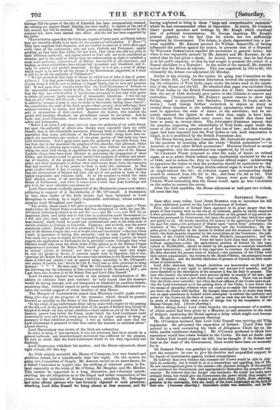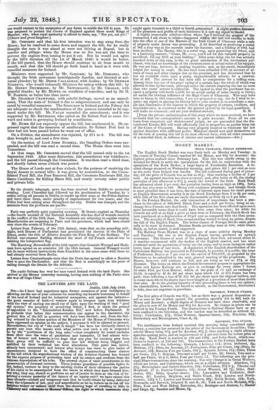SATURDAY NIGHT.
From the condition of Ireland there appeared to be great danger that the people of that country were on the eve of an outbreak, unless by timely measures
it were prevented. He did not come to Parliament on the ground of any secret in- formation possessed by Government, but upon the ground of that which was open and public to all. He briefly sketched the history of the agitations of Ireland for the past few years,—the advocacy of Repeal upon "moral force" principles; the secession of the "physical force" now the Confederates; the im- pulse given to agitation by the famine in Ireland and the measures taken for its relief; the fresh impulse imparted by the commotions on the Continent; the pub- lication of the Untied Irishman, with John Mitchel's transportation; and the succession of the Irish Felon. From the latter Lord John read extracts of re- bellious suggestions,—that the agricultural produce of Ireland for this year, valued at 80,000,0001., should be seized by the populace as materials wherewith to begin insurrection; and that it was expedient to overturn the British power. He then sketched the present state of Ireland,—the extension of the Clubs with their secret organization; the reviews by Mr. Smith O'Brien; the attempted rescue of Mr. Meagher; and the forcible liberation of persons at Carrick-on-Suir under threat of insurrection.
Lord John observed, that though doubtless any insurrection would be put down if it began, it was right to anticipate and prevent it if possible; and he came therefore to the description of the measure it was his duty to propose. The men who headed the movement were persons skilled in evasion of the law; and it was necessary to have a law which they could not evade. There was no doubt that the Clubs were unlawful; but when the Law-officers of the Crown came toad- vise the Lord-Lieutenant as to the putting down of the Clubs, it was found that the means of procuring evidence were not such as to enable the Government to put down the Clubs with facility. He thought there could be no doubt that there was an open association in Ireland which attempted to subvert the authority and power of the Crown by the force of arms; and as such was the fact, he knew of no mode of dealing with such a state of things but by the suspension of the Habeas Corpus Act. (Great cheering.) Before sitting down, Lord John bespoke the postponement of a motion, of which notice had been given by a Member, to call attention to the state of Ireland; cautioning the House against a delay which might cost human life. He sat down amidst general cheering. Mr. O'Cointoa declared that Lord John Russell was reviving old Wbfg arguments. He advocated the separation of Ireland. [Lord John here pointed to a card containing the Oath of Allegiance which lay on the table, amidst vociferous cheering.) Mr. O'Connor professed to think that separation would best retain Ireland to the Crown. He had no doubt that Sir Robert Peel would support the bill; but he thought if Sir Robert had been at the head of the Government, there would have been no necessity for it.
Sir ROBERT PEEL was gratified by this anticipation that he would sup- port the measure: he rose to give his decisive and unqualified support to the hands of Government against wicked conspirators.
He believed that even without this measure the Crown would be able to esta- blish its authority, but it would do so at a tremendous and appalling loss of life. He saw encouragement given to the masses—the physical strength of the country —to overthrow the Government, and appropriate to themselves the property of the country. He believed that the danger was imminent. He would not insist upon ordinary forms, but would give the Government the power which they sought, at once and without delay. He wished to put down those Clubs, those shooting- galleries in the metropolis with the heart of the Lord Lieutenant as the butt of their aim. (Immense cheering.) Immediate action was desirable; and he for one would consent to the suspension of any forms to enable the bill to pass. He was prepared to protect the Crown of England against those mock Kings of Munster, who, when royal authority is offered to them, say, "Not yet, not yet !" (C7teers and great laughter.)
Mr. OSBORNE said that his first intention was to stay away from the House; but he resolved to come down and support the bill; for he really thought the men it was aimed at were not driving at Repeal, but at murder and pillage: when the House was on fire was not the time to prevent the engines from issuing to put it out. But he would not agree to the bill's duration till the 1st of March 1849: it would be better, if the bill passed, that the House should continue to sit from month to month, and that this bill should go forth hand in hand as it were with remedial measures for Ireland.
Ministers were supported by Mr. SADLIER; by Mr. DISRAELI, who thought the Irish movement unmitigatedly Jacobin and directed at uni- versal plunder; by Mr. DENIS CALLAGHAN with doubts; by Sir DENH.AM NORRETS, who would indemnify Ministers 'for acting without this bill; by Mr. HENRY DRUMMOND; by Mr. NEWDEGATE; by Mr. GROGAN, with grateful thanks; by Mr. Mtrerrz, on condition of remedies; and by Sir H. W. RA.RRON, as better late than never.
Mr. SHARMAN CRAWFORD, with painful feelings, moved as an amend- ment, That the state of Ireland is due to misgovernment, and can only be cured by remedial measures. The forces now in Ireland and the Felony Act are adequate to check the machinations of the persons intended to be cap- tured under this bill. Mr. FAGAN seconded the amendment; and it was supported by Mr. REYNOLDS, who called on Sir Robert Peel to come for- ward and assist in goverping Ireland by conciliation.
Mr. HUME did not expressly oppose the bill, but condemned it. He ex- pressed regret that the measures of amelioration Sir Robert Peel had in view had not been passed before he went out of office.
On a division, the amendment was rejected, by 271 to 8. The bill was then brought in, and read a first time.
On the motion of Lord Joint RUSSELL, the Standing Orders were sus- pended, and the bill was read a second time. The House then went into Committee.
At that stage, Mr. OSBORNE moved that the bill extend only to the 1st September 1848. After some discassion, this amendment was withdrawn; and the bill passed through the Committee. It was then read a third time, and shortly before seven o'clock was passed.
The House of Lords met at four o'clock, for the purpose of receiving the Royal Assent to several bills: it was given, by commission, to the Conso- lidated Fund Bill, the Poor Removal Bill, the Commons Enclosure Bill, the Game Certificate for Killing Hares Bill, and nearly seventy other public and private bills.



























 Previous page
Previous page